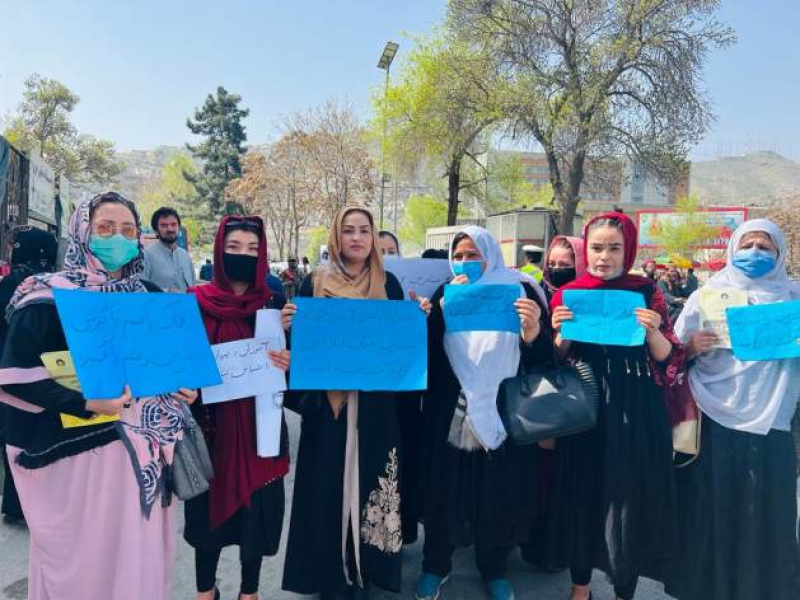- Corruption Persists Despite Uprising, TI Chairman Warns |
- Gaza Attacks Intensify as Disabled, Hungry Civilians Suffer |
- Stock indices edge up in first hour at DSE, CSE |
- World Cup ticket prices to start at $60, may rise to $6,730 |
- Gazipur kitchen market fire under control after one hour |
Afghan Women Demand Real Action, Not Sympathy or Words

During the first years of Taliban rule in Afghanistan, brave Afghan women in Kabul and several other provinces rose up in protest.
This year marks the fourth anniversary of the Taliban retaking power in Afghanistan. All these years have been a long nightmare for Afghan women, who have borne the brunt of oppression—arguably the worst of its kind anywhere in the world.
To mark the occasion, it is important to look back over the last four years to understand how it all unfolded and how Afghan women have endured so far.
On 15 August 2021, Kabul, the capital of Afghanistan, fell to the Taliban. The event marked the end of the Islamic Republic of Afghanistan, led by Mohammad Ashraf Ghani, and the return of the “Islamic Emirate of Afghanistan” under Taliban rule. This political change started a new chapter of suffering, systemic bans, and harsh restrictions reserved mainly for women and girls.
Within a short time, the Taliban introduced strict rules affecting education, work, public life, and travel. Girls were banned from school; women were removed from government work and the public sector; they were compelled to wear full coverings and were not allowed to travel without a male guardian.
The Taliban’s Ministry of Education announced that only primary schools—up to grade 6—would stay open for girls. Secondary and high schools were suspended “until further notice” and would only reopen if “Islamic rules were followed, such as wearing proper religious clothing.” Four years on, this so-called temporary suspension is still in place.
In September 2021, the Taliban shut down the Ministry of Women’s Affairs and handed over its building to the Ministry for the Promotion of Virtue and Prevention of Vice. This replaced a ministry dedicated to gender equality and women’s participation in national development with one notorious for its harsh treatment of women and girls.
By December 2021, the Taliban made wearing a full-body burqa mandatory for women. At universities, female and male classes were completely separated.
Afghan women did not accept these oppressive rules passively. They protested in the streets of Kabul with slogans such as “Work, education, freedom, and political participation are our rights.”
The Taliban responded with brutal force, including firing live rounds into crowds, but the women remained undeterred. Protests spread to other provinces, including Herat, Balkh, Badakhshan, Daikundi, Bamyan, and Nangarhar.
In 2022, the Taliban escalated bans on women’s social life, starting with education. Afghan girls were officially banned from universities and barred from registering for entrance exams. Media restrictions and mandatory dress codes intensified. By May 2022, wearing a full-body abaya with a niqab became mandatory, with fines, job loss, and imprisonment for non-compliance.
In April 2022, women were assigned specific days to visit public parks. By November, they were completely banned from parks, gyms, and bathhouses. Travel restrictions prohibited women from moving more than 72 kilometres without a male guardian, regardless of whether the guardian was able to accompany them. Violators faced vehicle seizure or imprisonment.
Women were eventually removed from government jobs, with the largest wave of dismissals in September 2022. By December, women’s participation in NGOs, international organizations, and UN offices was completely banned, affecting thousands, including nurses and midwives, severely jeopardizing healthcare services in an already war-torn country.
Over the years, bans and decrees intensified. Public floggings, stoning, and executions were carried out against women accused of moral crimes in provinces such as Logar, Kabul, Herat, Faryab, Jawzjan, and Ghor.
Despite these threats, Afghan women continued to protest, chanting slogans such as “Bread, Work, Education It’s Our Right” and “We Will Not Back Down.” Their courage and resilience became a symbol of civil resistance for Afghan women everywhere.
By 2025, Afghan women remain trapped under systematic oppression. Learning centers are silent, universities forgotten, beauty salons shut down, and dreams exorcised from minds. Yet, they still hold onto hope that freedom, education, and justice will return.
This hope will only become reality when the international community, including the European Union, responds with tangible, effective actions. Afghan women are not asking for sympathy or words of condemnation—they are demanding real action. Now it is the turn of the international community to stand with them.

